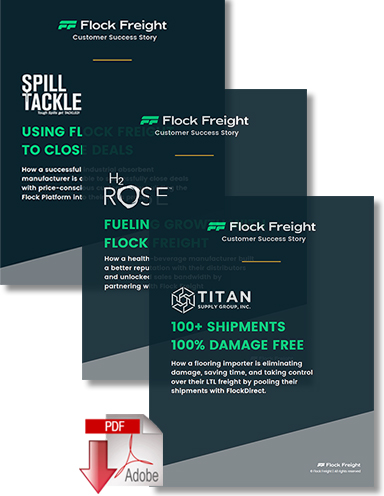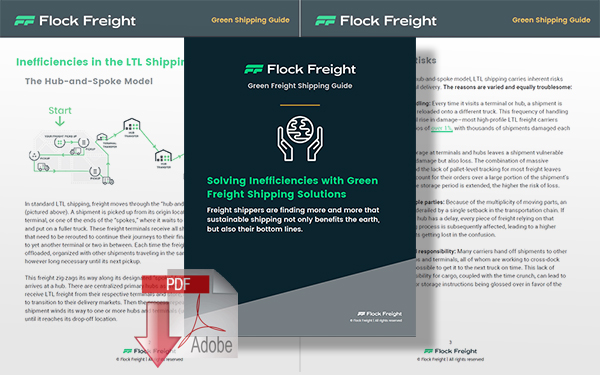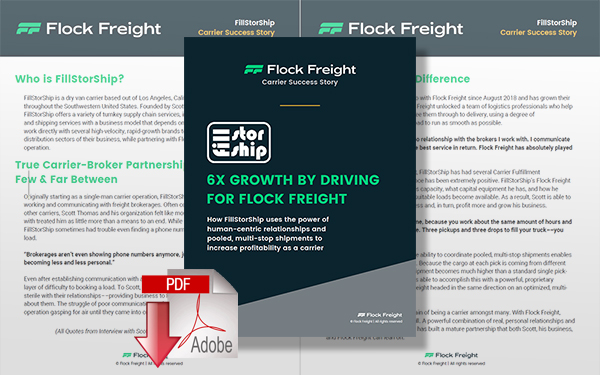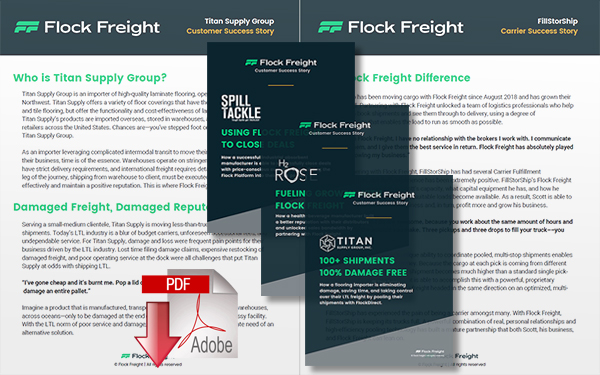Pooling Freight Is Helping Shippers Maximize Spend During the Coronavirus Pandemic

The COVID-19 outbreak has revealed some hard truths about supply chain management - Flock Freight’s pooling method is providing solutions.
Flock Freight’s Pooling Solutions
The Coronavirus Pandemic has continued to cause unpredictable market conditions in the trucking industry.
As nations navigate new economic and health challenges, logistics companies are drawing on survival tactics - like conserving capital, strengthening the bottom line, and cutting costs - to weather the storm.
While consumers are still clearing shelves of necessities (like groceries, cleaning products, and over-the-counter medicines), many experts believe the initial wave of demand for such consumer goods is over.
This overall decrease in freight combined with non-essential business shutdowns impacts the 2020 outlook of every company in the supply chain.
Market volatility will continue to challenge shippers and carriers as they work to meet consumer demand.
We’ve seen one scenario play out over and over again: Shippers with less-than truckload-size loads are paying for full truckload (FTL) service to ensure faster delivery of goods, resulting in space and spend inefficiencies.
Isn’t there a better way to ship? With Flock Freight, there is, and the answer is pooling.
Freight and the Coronavirus Crisis
Before we dive into pooling, let’s examine the current landscape and forecasts for the remainder of 2020. Volumes were steady through the end of March but tapered off at the beginning of April when demand slowed.
Routing guide pressure that many had originally predicted to occur towards the end of June appeared sooner than expected when an increase in tender rejections caused an uptick in spot demand, which resulted in routing guide breakdowns.
Right now (April 2020), supply is decreasing because non-essential businesses aren’t open and truck drivers are changing their lane preferences or keeping trucks parked. These factors are also contributing to long-haul market changes.
The East Coast market has shifted from stable to very tight, while the West Coast market has become seemingly loose. Capacity has been challenging in the Northeast (read: New York and northern New Jersey), but easier to find in the Southwest. These patterns are generally common, but today’s circumstances are magnifying them.
We’re also seeing other markets flatten or shrink slightly and rates drop gradually across the country. As coronavirus continues to throw curveballs at the trucking industry and fuel uncertainty about what’s to come, we expect businesses to remain in self-preservation mode.
We Expect Volume to Decline In 2020
When it comes to volume estimates for the rest of the year, FTR Transportation Intelligence forecasted a month ago that “...truckload capacity will shrink 1.4% this year - a contraction, but not a bloodbath.” According to Jeff Tucker, CEO of Tucker Company Worldwide, the market will have to recover from “[lulls] in freight demand and pricing caused by the drop in imports and economic activity following the coronavirus epidemic.”
Chris Pickett, Coyote’s Chief Strategy Officer, believes these effects “could create a permanent dent to consumer demand … [and] pull-down business activity as a result.” He points out that a slow economy and an extended quarantine could make spot truckload market rates peak prematurely. These predictions lead Pickett to believe 2020 will record an inflationary spot market.
Before coronavirus took hold in the United States, SanMar Global Logistics Director John Janson estimated that companies that run in “a more just-in-time environment … or require more safety stock” would be affected the most by the pandemic. We’ve seen this conjecture come to pass as businesses with global supply chains have scrambled to keep processes intact and fulfill an increasing number of orders.
Without a doubt, the situation has proven erratic. Companies that are creating near-term and long-term plans for 2020 should focus their efforts on factors they have control over.
Don’t Depend on Less-Than-Truckload (LTL)
Fewer companies working at full capacity means there’s less freight for the trucking industry to move. Shippers who normally use FTL for full-size or partial loads need to deliver smaller amounts of freight just as fast or faster than they did before coronavirus, a context that’s pushing them towards less-than-truckload (LTL) shipping to save on FTL costs.
LTL isn’t the answer though. By moving shipments through the outdated hub-and-spoke system (which adds touchpoints at various terminals and hubs), LTL shipping increases transit times, losses, and damages - all of which shippers need to avoid in today’s environment.
Instead, shippers should anticipate lower quantities of purchase orders that fall into the volume LTL range and analyze pricing based on the truck space they need. There’s often a significant gap between these two aspects, which is where pooling comes into play.
Pay Only For Space You Need
Pooling combines LTL and partial shipments based on geographic location or route by grouping shipments that are moving from regionally similar locations to regionally similar destinations on one truck. The truck travels directly from Point A to Point B without terminal stops, which slashes transit time. Shipments never leave the truck during travel, so there’s virtually no risk of them getting lost. Plus, pickup and delivery are the only times they’re handled, which puts the risk of damage at about zero.
By filling trucks with freight from other shippers, pooling eliminates wasted space for shippers with load sizes that fall between FTL and LTL. And we’ve yet to explore one of the best benefits of them all: cost savings.
As the only company with a unique algorithm that optimizes pooling, Flock Freight has figured out how to provide FTL service at a better rate. Flock Freight uses linear feet and pallet count to determine pricing, and most shippers realize savings as high as 20%.
In terms of today’s unstable economy, pooling helps shippers maximize their spend. More than that, it provides the fastest way to deliver shipments.
In Conclusion: Turn to Freight Pooling
The effects of coronavirus - including irregular buying behavior and government-mandated closures - have essential businesses bootstrapping and global markets reeling. But the trucking industry is adjusting and finding ways to deliver critical freight on time, helping the nation’s communities treat the sick and ride out quarantine life.
Flock Freight is pooling food, beverages, medical supplies, and other shipments at this time to help shippers deliver shipments quicker and with less damage.
Related Article: How the Coronavirus is Impacting the Trucking Industry
Related Resources
Solving Inefficiencies with Green Freight Shipping Solutions
In this green freight shipping guide, we describe how freight shippers are finding more and more that sustainable shipping not only benefits the earth but also their bottom lines. Download Now!
Flock Freight: FillStorShip Carrier Success Story
Learn how FillStorShip, a dry van carrier based out of Los Angeles, California, uses the power of human-centric relationships and pooled, multi-stop shipments to increase profitability as a carrier. Download Now!
Flock Freight: 3 Customer Success Stories
See how these three industry leaders, H2rOse, Spill Tackle, and Titan Supply Group, are using Flock Freight to streamline their supply chains. Download Now!
More Resources from Flock Freight
Article Topics
Flock Freight News & Resources
Wasted Space and Damaged Freight Overshadowed Favorable Conditions for Businesses in 2022 Top Issues Affecting Shippers Last Year 6 Lessons from CSCMP EDGE 2022 to Improve Shipping Freight & Supply Chain Inefficiencies Inefficiency - Not Just the Labor Shortage - Is Breaking Supply Chains Today’s Post-Pandemic Parcel Delivery Marketplace A Shipper’s Guide to Navigating Post-Pandemic 2022 Holiday Freight Shared Truckload Freight Increases Carrier Revenue by 20% More Flock FreightLatest in Transportation
Ranking the World’s 10 Biggest Supply Chains The Top 10 Risks Facing Supply Chain Professionals Walmart’s Latest Service: Ultra Late-Night Delivery City of Baltimore Files Lawsuit to Recoup Money for Collapsed Bridge The Era of Self-Driving Tractor-Trailers Set to Begin Is the Trailers as a Service (TaaS) Model Right For Your Business? Why Grocery Shoppers are Leaving Stores to Buy Their Food Online More Transportation



















